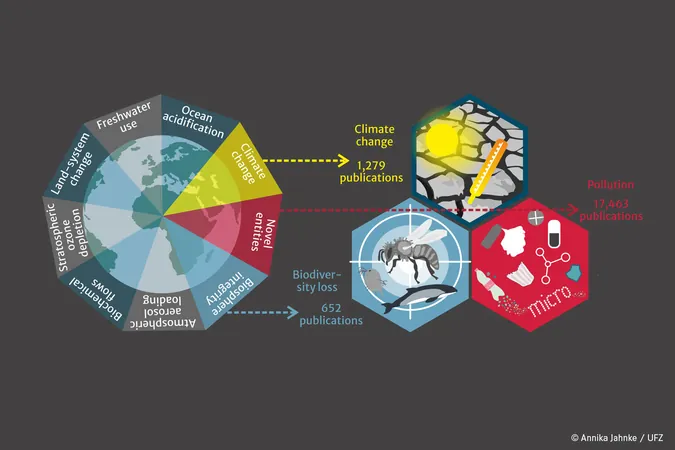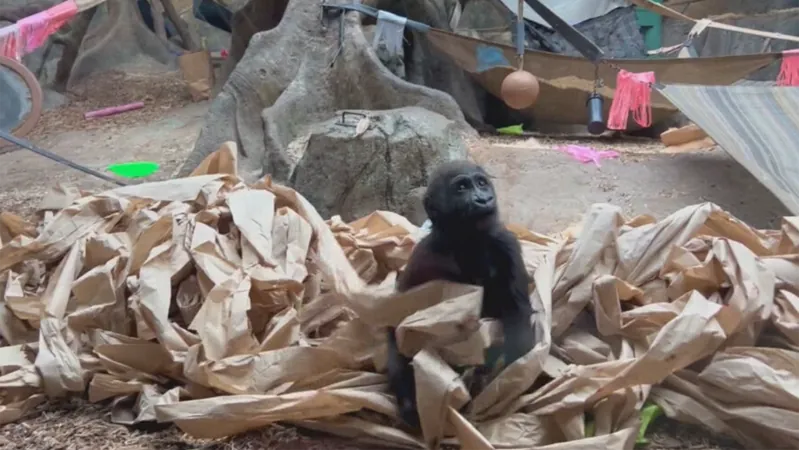
Plastics: The Overlooked Culprit in the Triple Planetary Crisis
2024-11-21
Author: Charlotte
Introduction
A recent study highlights the urgent need to address the multifaceted impacts of plastics on the environment, particularly concerning climate change and biodiversity loss. While the harmful effects of plastics on pollution have been extensively documented, their role in the ongoing triple planetary crisis—comprising climate change, biodiversity loss, and environmental pollution—has received inadequate attention.
Study Overview
In a groundbreaking overview published in the journal Environment International, an interdisciplinary team from the Helmholtz Centre for Environmental Research (UFZ) meticulously analyzed over 19,000 studies related to plastics and their far-reaching implications. Alarmingly, only 1,279 studies addressed climate change's relationship with plastics, and a mere 652 focused on biodiversity impacts, overshadowed by the 17,463 studies concerning environmental pollution.
Calls for Comprehensive Research
Dr. Christian Schmidt, a hydrogeologist at UFZ, emphasizes the fragmented scientific understanding surrounding these crises. He states, "There is an extremely divergent drift in the available knowledge," underlining the need for comprehensive research.
Upcoming Global Plastics Treaty
The paper comes at a pivotal time, as the UN prepares for negotiations on the Global Plastics Treaty set to take place from November 25 to December 1 in Busan, South Korea. This platform presents an opportunity for nations to adopt robust regulations that account for plastics' extensive impacts beyond mere waste management.
Plastic Production and Mismanagement
Research indicates that since the 1950s, a staggering 9,200 million tons of plastics have been produced globally, with only approximately 2,900 million tons in active use. Meanwhile, about 5,300 million tons are currently trapped in landfills, and a shocking 1,000 million tons have been incinerated. Alarmingly, between 1,750 and 2,500 million tons of plastics are classified as "mismanaged," posing a significant risk of leaking into ecosystems.
Knowledge Gaps
Moreover, the study reveals important knowledge gaps surrounding the transport of plastics by wind and water, their accumulation in oceans, and their interaction with environmental factors such as ultraviolet radiation and temperature. Particularly concerning is the lack of insights into nano-sized plastics, which have not been studied as extensively as microplastics.
Chemical Composition Concerns
While the chemical composition of plastics remains largely uncharted territory, an astonishing 640 million tons of additive chemicals have been incorporated into plastic products. These substances can include UV stabilizers and plasticizers, yet their potential repercussions on human health and the environment are scarcely understood.
Environmental Ramifications
The environmental ramifications are profound. Plastics contribute to greenhouse gas emissions through their production processes and can profoundly disrupt biogeochemical cycles, particularly in oceans. The interaction of plastics with marine ecosystems has been increasingly scrutinized regarding impacts on marine biodiversity, habitat alterations, and even species transportation via plastic debris.
A Life-Cycle Approach
"Plastics should not be viewed solely as a waste issue," asserts Dr. Schmidt. "Their entire life cycle—from raw material extraction to disposal—must be examined." As climate change and biodiversity loss are interlinked issues, the UFZ researchers advocate for a holistic regulatory approach. They argue that comprehensive international policies are essential to confront these challenges effectively.
Legislative Implications
The implications for future legislation are clear. Current regulations only address a fraction of the roughly 16,000 chemicals found in plastics, with over 4,200 being persistent environmental hazards. The researchers call for replacing problematic chemicals with safer alternatives that can perform the same functions.
Conclusion
As world leaders gear up for the upcoming treaty discussions in Busan, they must prioritize harmonizing regulations impacting climate and biodiversity alongside those managing plastics. The message is clear: Without drastic and immediate action, the plastics crisis will remain an all-consuming threat to our planet. Will 2023 mark a turning point, or will we continue to drown in our plastic waste? The stakes have never been higher.









 Brasil (PT)
Brasil (PT)
 Canada (EN)
Canada (EN)
 Chile (ES)
Chile (ES)
 España (ES)
España (ES)
 France (FR)
France (FR)
 Hong Kong (EN)
Hong Kong (EN)
 Italia (IT)
Italia (IT)
 日本 (JA)
日本 (JA)
 Magyarország (HU)
Magyarország (HU)
 Norge (NO)
Norge (NO)
 Polska (PL)
Polska (PL)
 Schweiz (DE)
Schweiz (DE)
 Singapore (EN)
Singapore (EN)
 Sverige (SV)
Sverige (SV)
 Suomi (FI)
Suomi (FI)
 Türkiye (TR)
Türkiye (TR)